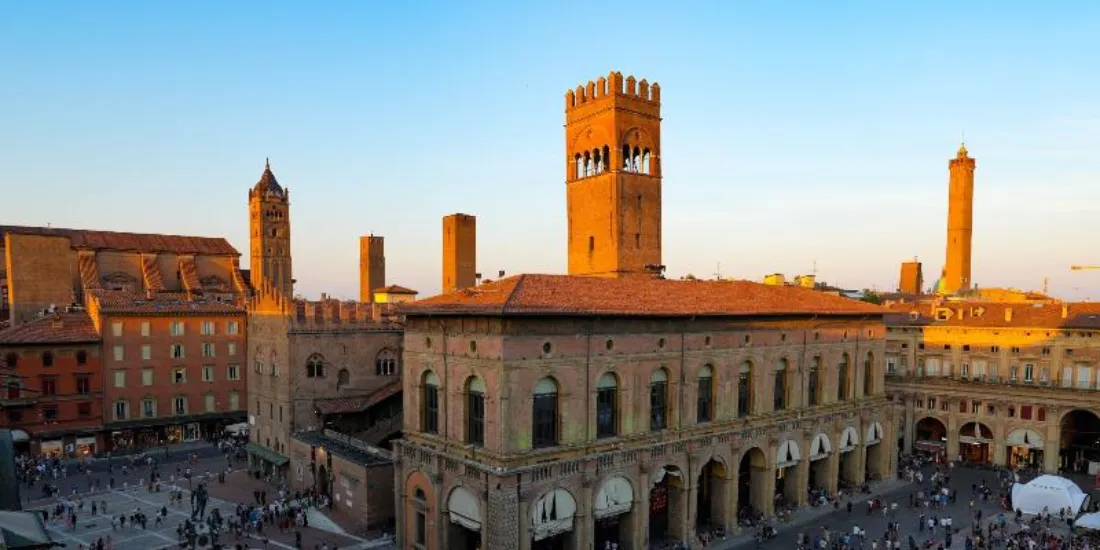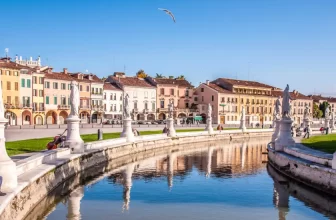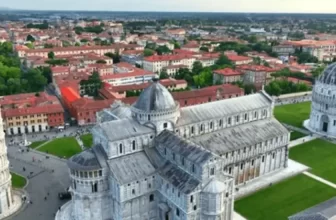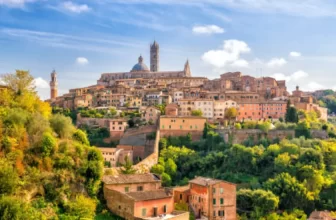
The first thing that hits you when you walk out of Bologna Centrale station isn’t the heat-it’s the color. Everything from the buildings to the sidewalks lives on this warm spectrum of red, orange, and terracotta. It’s a little overwhelming. There are scooters zipping through tight streets, students speaking three languages at once, and that faint smell of espresso lingering mid-air.
When I first arrived, I had no idea where my Airbnb was. I ended up dragging my suitcase past Piazza Maggiore, sweating through my hoodie like a fool. Half because I was lost, half because it was somehow 28°C in early September. A kind stranger-and by that, I mean a UniBo student with noise-canceling AirPods-pointed me toward Via Zamboni, mumbling something like “it’s all uni stuff down there.”
That’s when it sort of hit me: this is Bologna. Chaotic in the most charming way. Streets full of architecture majors sketching columns beside TikTokkers filming street food. Fashion students wearing Doc Martens and oversized coats in 30 degrees. Professors speedwalk past with old leather briefcases. There’s life here-unfiltered, unpolished, and unapologetically Italian.
If you’re thinking of studying abroad and want the study guide in Bologna that tells you what it’s really like (yes, carbs and chaos included), this one’s for you.
Why Study in Bologna in 2026?
Why now?
Well, 2026 isn’t just a random year-it’s probably one of the best times to start your overseas education in Bologna. For starters:
- Italy is maintaining its status as one of Europe’s most affordable higher ed destinations for international students
- Post-pandemic policies around student visas and residence permits are now streamlined
- EU investment in clean tech, AI development, language education, and research grants is fueling new internship and work opportunities, especially in Bologna
Some numbers (but we’ll keep them useful):
- The University of Bologna (UniBo) hosts 90,000+ students, with over 7,500 international students enrolled across its multiple campuses
- More than 60 English-taught programs including Master’s, undergrad, and short-term certifications
- Italy was ranked #1 for student satisfaction in Europe (Study.eu, 2024) largely due to lifestyle and tuition affordability
- Tuition for international students in Bologna ranges from €2,000 to €3,500 per year-which, compared to the UK or US, is wild
Career-wise?
- Bologna is part of Italy’s “Motor Valley”, with brands like Lamborghini, Ducati, Maserati-and engineering students absolutely take advantage
- It’s also a smart choice for humanities, film, law, international relations, and food science
- Plus, you’re in the heart of the EU, so mobilità post-studi (post-graduation employment options) extend across Germany, France, and Netherlands
So why 2026? Because you’re hitting peak student mobility and opportunity. If you’re going to build your future, why not do it in the city that basically invented the university system in Europe?
Why Bologna Is Special for International Students
There are bigger cities, yes. Prettier ones? Maybe. But Bologna has what I call la vita vera-the “real life” feel.
Student Demographics & Diversity
- About 30% of all students in Bologna are from outside Italy
- The community is built around three words: students run everything
- Erasmus parties, language tandems, startup incubators, protest marches for climate justice-all organised by students
It doesn’t matter if you’re from India or Indonesia, Cameroon or Brazil-you’ll find your people here. And trust me, it’s not hard.
Support for International Students
The International Relations Office at UniBo is one of the busiest in Italy-and yes, they reply to emails!
- Help with residence permits, health insurance, and language courses
- University-run labour rights and visa renewal workshops
- Cultural adjustment programs like guided tours, student buddy programs, and legal advice
There’s a WhatsApp group for literally everything. One for Indian students, one for landlords, one where people argue about the best gelato in town. You’re never alone.
Career Connectivity
- UniBo has partnerships with over 800 companies
- You can get work placements at UN offices in Rome, tech hubs in Milan, and even BMW in Munich if you join the right research center
- Career week every semester-CV clinics, LinkedIn-building workshops, company booths offering real interviews (not just free pens)
Best Universities and Colleges in Bologna
Okay, let’s not sugarcoat it-the University of Bologna dominates the scene. It’s the MVP. But there are a few others you should have on your radar depending on what you’re studying.
University of Bologna (Università di Bologna – UniBo)
- Ranking: Top 200 globally, QS 2025
- Known For: Law, Engineering, Humanities, Medicine, Business, Political Science
- International Tuition Fees: €2,100–€3,500/year
- Campus vibe: Medieval meets modern. Ancient libraries with modern labs. Cafes inside cloisters. Professors who cite Roman philosophers in class unironically
- Standout programs:
- International Relations (MA – English)
- Sustainable Engineering
- Business and Administration (Bologna Business School)
- Early Modern History, AI & Digital Humanities
Bologna Business School (BBS)
- UniBo’s linked business graduate school
- Tuition: €14,000–€39,000 (yep, it’s pricey)
- Focus: Executive MBAs, International Business Master’s, AI & Innovation
- Strong alumni placement across Europe
Accademia di Belle Arti di Bologna
- Art, Fine Arts, Restoration, Design
- Great for creatives-studio access, modern facilities, placement in art galleries
- Not for the faint-hearted-professors are brutally honest
Conservatorio di Musica “G.B. Martini”
- If you’re a musician… this is heaven.
- High admission standards, but tuition just over €1,000/year
- Most classes in Italian, so basic language proficiency is a must
Top Student Accommodation in Bologna
Here’s where things get tricky. Housing in Bologna is a sport. But once you figure it out, you’re golden.
Studentato Camplus (Uni-Bo)
- Average Cost: €380–€500/month (shared room; studios are more)
- Includes all bills, Wi-Fi, gym, shared kitchen
- Super close to main faculties
Er.Go Housing (Regional Student Authority)
- Government-backed student housing
- Spaces are limited, but prices are unbeatable: €220–€350/month
- Application process can be competitive-apply early and follow up often
DoveVivo and Uniplaces (Private)
- Fully furnished shared apartments
- Price: €400–€600/month, bills not always included
- Clean, safe, but slightly more expensive-worth it if you value convenience
Homestays
- Average: €350/month with meals
- Great for language immersion
- Not super popular but exists-ask UniBo’s international office for trusted connections
✋ Pro Tip: Check out “Affitto Studenti Bologna” on Facebook. Expect A LOT of DMs, ghosting, but also gems. Use WhatsApp voice notes to stand out when reaching landlords.
Best Neighborhoods for Students in Bologna
Let’s be brutally honest-choosing the wrong neighborhood in Bologna can mess up your whole rhythm. Here’s where students actually live and what it’s like.
Via Zamboni / Centro Storico
- Atmosphere: Heart of student life-bars, libraries, UniBo buildings everywhere
- Rent: €450–€700/month
- Pros: You’re in the middle of everything, walk to class
- Cons: Loud. Like, street-performers-at-1AM kind of loud
San Donato
- Vibe: Diverse and budget-friendly
- Rent: €350–€550/month
- Great for: Medicine, Engineering, and STEM students
- Cons: A bit farther from city centre (15-20 mins walk), but very connected
Bolognina
- Vibe: Up-and-coming, multicultural, a bit gritty but getting cooler
- Rent: €400–€600/month
- Close to Bologna Centrale-well connected for commuters
- Good for folks who want to avoid the high prices of the centre
Saragozza
- Vibe: Green, residential, chill
- Rent: €400–€650/month
- Less “party-town”, more “quiet-study-vibes”
- Ideal for postgraduates or students who actually sleep
Monthly Cost of Living in Bologna
Spoiler: Bologna is cheap… IF you can score affordable rent. Things like food and transport? Super budget-friendly.
| Expense | Low (€) | Average (€) | High (€) |
| Accommodation | 300 | 450 | 700+ |
| Groceries | 120 | 180 | 250 |
| Transport (Bus Pass) | 27/month | 27 | 27 |
| Internet/Phone | 25 | 35 | 45 |
| Social Life/Entertainment | 50 | 100 | 150+ |
| Books + Supplies | 30 | 50 | 80 |
| Misc (Health, laundry, gym) | 20 | 40 | 70 |
| Estimated Monthly Total | €570 | €880 | €1,350+ |
Money-Saving Tips for Students in Bologna
- Pasta is basically free here. You can eat well for €25 a week if you cook
- Get a Tper student travel card for €27/month (unlimited within city limits)
- Thrift shops + vintage markets are the move-also very on-brand for Bologna students
- Use TooGoodToGo app for discounted food at night
Scholarships and Financial Aid
Good news: Italy actually offers generous merit and needs-based scholarships, even for non-EU students.
UniBo Action 2 & Action 1 Scholarships (Very Popular!)
- Award: Tuition waivers + €11,000 grant per year
- Open to students outside the EU
- Application usually opens January and closes around April 2026
Er.Go Regional Scholarships
- Available for both EU and non-EU students
- Based on family income + merit
- Can cover: tuition reduction, food vouchers, accommodation bursary
Other Funding to Dig For:
- Invest Your Talent in Italy (for STEM & business students from selected countries)
- MAECI grants (offered by the Italian Ministry of Foreign Affairs)
- Home-country donor programs or bilateral agreements
📝 Pro tip: Get your family’s ISEE-equivalent documents translated early-you’ll need it for Er.Go
How to Apply – Step-by-Step for 2026 Intake
Here’s how to avoid panicking at 2AM two days before the application deadline.
1. Research Programs & Eligibility (Oct–Dec 2025)
- Use UniBo’s official course portal
- Look for international degree programs
- Check if the program is taught in English or Italian
2. Prepare Documents
- Passport
- Transcripts (translated + certified)
- Proof of English or Italian proficiency
- Motivational letter/personal statement
- CV/resume
- Reference letters
3. Apply Online via StudentiOnline (Jan–Apr 2026)
- Portal: studenti.unibo.it
- Create an account + upload docs
- Pay application fee (usually €60–€100 depending on course)
4. Wait for Offers + Apply for Scholarships (Mar–May 2026)
- Interviews may happen via Zoom
- Accept your offer and confirm seat
- Submit scholarship applications as early as March 2026
5. Apply for Visa + Book Housing (June–July)
- Once you get conditional/unconditional acceptance + scholarship notices
- Start residence permit (permesso di soggiorno) prep
Student Visa for Italy (and Work Rules in 2026)
Okay, don’t stress. The Italian visa process is slower than other Schengen countries, but it’s not impossible if you stay on it.
What You Need
- UniBo acceptance letter
- Proof of funds (~€6,500/year in bank)
- Accommodation proof (host letter, lease, or hotel stay)
- Passport
- Health insurance (1 year coverage)
- Visa fee: ~€60
Timeline
- Apply at least 90 days before your travel date
- Visa approval can take up to 45 days
- Once in Italy, apply for Permesso di Soggiorno within 8 days of arrival
Work Rights
- You can work 20 hours/week during term
- Full-time during holidays
- To get a part-time job, you’ll need a codice fiscale + permit to work
- Many students find jobs in cafes, schools (language teaching), or university support roles
Getting Around Bologna: Public Transport Tips
You 100% don’t need a car. In fact, having one can be a liability here.
🚍 Bus / Metro
- Tper runs Bologna’s bus and train network
- Monthly student pass: €27
- App to install: Roger (route planner, buy tickets)
🚶 Walking
- It’s a walking city. From Centro to San Donato is about 25 minutes on foot
🚲 Bikes & Scooters
- City has okay-ish bike lanes
- You can rent e-scooters like Helbiz, but lock them well at night
📱 Other apps students use:
- Moovit or Google Maps
- Trainline for regional trips
- BlaBlaCar to carpool on weekend trips to Milan/Verona/Florence
Student Life, Cafes, and the Bologna Vibe
Let’s be real: you’re gonna study here, but you’re also gonna live here.
A Typical International Student Day
8:30AM – Struggle to get out of your twin bed in a shared flat
9AM – Class in Italian Cinema or AI Ethics in via Zamboni
12PM – Espresso + €2 panino from Cafe Rubik
2PM – Back-to-back lectures or side gig tutoring a local family
6PM – Sunset walk up to San Michele in Bosco
8PM – Dinner with flatmates (usually overcooked pasta and debate)
10PM – Aperitivo in Piazza Verdi or jazz night at Camera Jazz
Where Students Actually Hang Out
- Piazza Santo Stefano – picnic central
- Le Stanze – drinks in a former church, yes it’s as cool as it sounds
- Osteria dell’Orsa – pasta, cheap wine, loud conversations
What Surprises Most Students
- How late Italians eat (8pm isn’t considered dinner, it’s early)
- Almost everything closes mid-afternoon (rip, 2PM coffee plans)
- You’ll do more presentations and group work than you expect
- Student support services are real-and actually useful
Career Opportunities and Internships in Bologna
Your parents want ROI. Here’s what that looks like:
Top Hiring Sectors in Bologna
- Automotive engineering + AI (think Ducati, Lamborghini)
- Research/Academia (UniBo is an academic jungle)
- Food sciences + gastronomy
- Film & cultural management
- Sustainable development/green energy
Internship Culture
- Expect more unpaid internships than you’re used to but often come with credits + solid placement value
- University career services offer paid ones, especially for MA programs
✅ Join AlmaLaurea, UniBo’s career portal
✅ Post-grad? Consider post-study work extensions across EU countries
✅ Use LinkedIn Italia, JobRapido, and local Uni groups to find student jobs
Short-Term Study Options
Don’t want to commit to full-time? Here are valid alternatives.
- Summer schools at UniBo – from artificial intelligence to gender studies, 2–4 weeks, ~€1,400
- Exchange students through Erasmus+, CEEPUS, etc.
- Language + culture intensive programs (1–6 weeks), open to all levels
2026 Application Timeline (Save This)
| Month | Task |
| Oct – Dec 25 | Research + shortlist programs |
| Jan – Mar 26 | Apply to universities + scholarships |
| Apr | Receive offers // begin visa prep |
| May – June | Accept offers, pay tuition deposit |
| June – July | Visa processing + housing search |
| August | Book flights + prep docs + join WhatsApp groups |
| Sept 2026 | Arrive in Bologna for orientation + residency steps |
Public vs Private Universities in Bologna – Side-by-Side
| Factor | Public (e.g., UniBo) | Private (e.g., BBS) |
| Tuition Fees (Intl.) | €2,200 – €3,500/year | €12,000 – €39,000/year |
| Campus Life | Active, student-style | More corporate, business-driven |
| Research Access | Open, funded | Depends on program |
| Student Experience | Authentic, diverse | Professional & focused |
| Funding Options | More accessible | Limited or merit-only |
Final Thoughts – Is Bologna Right for You?
Honestly? If you want a place that:
- Doesn’t try to be perfect
- Feels alive 7 days a week
- Gives affordable education, top-ranked professors, and real global value
- Nurtures the academic and personal you
…then this might be it.
It’s not always easy. Permesso di soggiorno headaches, language barriers, homesickness-they’re real. But so are the growth, the people, the language you’ll pick up, and the home you’ll build in one of the world’s oldest university towns.
Quick First-Year Tips:
- Learn basic Italian phrases before you land
- Budget 2 months to find housing-start early
- Ask questions. Even if your grammar’s wrong. No one cares
- Save all your receipts for permesso docs
- Never say no to aperitivo. Trust me on this one.
Top FAQs – Studying in Bologna
If you manage rent well, it’s one of the most affordable in Europe. Budget €800–€1,000/month total.
Yes-up to 20 hrs/week. But be ready for paperwork. Local jobs often require Italian skills.
Very. Like any city-be smart at night, especially around train station. But I’ve walked home at 2AM with no problem.
Yes. Apply for Italy’s Job Search visa or move to another EU country with your degree.
Competitive-but totally doable with preparation. Focus on motivation letters + income documents.
Start looking in October 2025. Apply between January–March 2026 for most programs.






